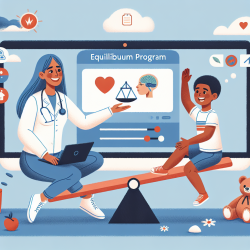Child maltreatment is a global public health crisis with far-reaching consequences. In Brazil, the Equilibrium Program (TEP) has emerged as a community-based interdisciplinary intervention program that provides multi-dimensional bio-psycho-social treatment for traumatized and neglected children and adolescents. As practitioners, we can draw valuable insights from TEP's innovative approach to enhance our therapeutic practices and outcomes for children.
Understanding the Equilibrium Program
TEP was established in São Paulo to address the lack of suitable public services for children exposed to drugs and living on the streets. It operates in partnership with the University of São Paulo, various service providers, and municipal departments. The program is set within a municipal sports club, creating a safe, non-stigmatizing environment that encourages community reintegration.
Key Components of TEP
- Interdisciplinary Approach: TEP integrates health services, social services, educational support, and justice services to provide comprehensive care.
- Initial Diagnostic Phase: A 4-week assessment by a multidisciplinary team to develop a personalized therapeutic plan.
- Individualized Interventions: Includes psychiatric and pediatric assessments, psychotherapy, art and speech therapy, school support, and recreational activities.
- Case Management: Ensures continuity of care and coordination between program activities and external agencies.
Research and Outcomes
TEP has demonstrated significant improvements in the social and family reintegration of participants. Research projects within the program have provided critical data on the prevalence of psychiatric disorders, treatment adherence, and the impact of early-life stress on cognitive function. These insights are invaluable for developing effective interventions and expanding similar programs.
Practical Implications for Practitioners
Practitioners can enhance their therapeutic approaches by adopting key elements from TEP:
- Interdisciplinary Collaboration: Work closely with other professionals to address the multifaceted needs of children.
- Comprehensive Assessments: Conduct thorough initial assessments to inform personalized treatment plans.
- Safe and Supportive Environments: Create non-stigmatizing settings that encourage participation and community reintegration.
- Ongoing Research: Engage in research to continuously improve interventions and understand the population served.
Encouraging Further Research
While TEP provides a robust framework, continuous research is essential to refine and adapt interventions. Practitioners are encouraged to contribute to research efforts, share findings, and collaborate with academic institutions to enhance the quality of care for maltreated children.
To read the original research paper, please follow this link: Community-Based Global Health Program for Maltreated Children and Adolescents in Brazil: The Equilibrium Program.










